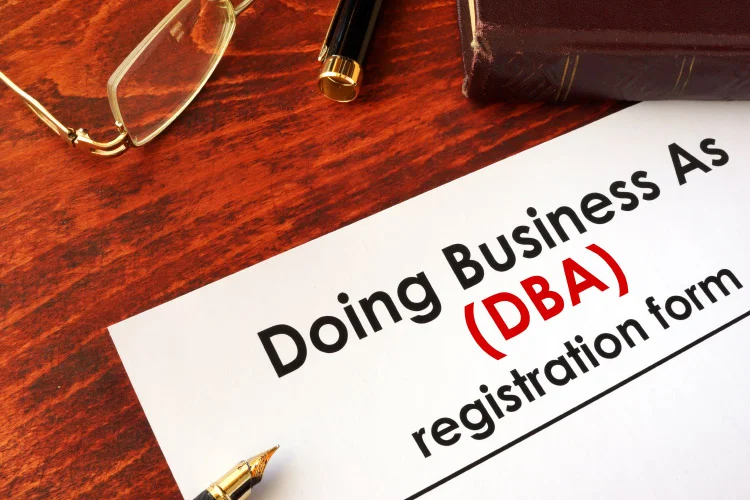DBA in Massachusetts: Smart, Simple Way to Grow Your Business
Updated time: Nov 10, 2025, 00:42 (UTC-08:00)
If you're running a business in Massachusetts but want to use a different name than your legal one, getting a DBA (Doing Business As) is usually a good idea, and sometimes the law requires it. A DBA lets you operate under a trade name without creating a whole new company.
This guide walks you through everything about setting up a DBA in Massachusetts. We will touch on the filing steps, local rules, costs, forms, and how to keep things legal in 2025. Whether you're a sole proprietor, LLC, or corporation, this article is your go-to resource for navigating the Massachusetts DBA registration process.
What Is a DBA in Massachusetts?
A DBA (Doing Business As) in Massachusetts is a legal way to operate your business under a name that differs from your registered name. It's also referred to as a business certificate or trade name.
For example, if your LLC is registered as “Anderson Tech Solutions LLC” but you plan to market your brand as “Boston Cloud Pros,” you must register a DBA in Massachusetts.
Key facts:
- A DBA is not a business entity (like an LLC or corporation)
- It does not offer liability protection on its own
- It’s required under Massachusetts law when using a trade name

Run Your Business with a DBA in Massachusetts
Who Needs to File a DBA in Massachusetts?
You must file a DBA if:
- You're a sole proprietor using a business name other than your full legal name
- You're an LLC or corporation operating under a different name than the one registered with the Secretary of the Commonwealth
- You're running multiple ventures or product lines under a single company
For example:
- DBAs are not required if operating under your full legal name (e.g., “John Smith”)
- But required if using “Smith’s Handyman Services”

File a DBA in Massachusetts
The process for Setting Up a DBA in Massachusetts
The process for setting up a DBA in Massachusetts is slightly different from other states. In Massachusetts, DBAs are filed at the city or town level, not statewide.
Here’s how to do it right in 2025:
Step 1: Choose Your Trade Name
Pick a name that aligns with your brand and is not deceptively similar to another business in your area.
- Avoid names that mislead consumers or include corporate suffixes like “LLC” or “Inc.” unless you're legally structured as such
- Each municipality may have different rules, so verify with your local city or town clerk
Step 2: Verify Name Availability
Unlike business entity names, DBA name exclusivity is not guaranteed in Massachusetts. However, you should still check:
- Your city or town’s DBA database
- Massachusetts Business Entity Search through the Secretary of the Commonwealth

DBA in Massachusetts is slightly different from other states
Step 3: Complete the Massachusetts DBA Registration Form
Each city or town has its own Massachusetts DBA registration form, often titled “Business Certificate.” The form typically asks for:
- Business name (DBA)
- Legal name of the individual or entity
- Business address
- Description of business activity
- Signatures (notarized in most cases)
You can usually obtain the form online or directly from the city/town clerk’s office.
Example: Boston uses the “Business Certificate Application,” which can be downloaded from [Boston.gov].
Step 4: Submit the Form and Pay the Fee
Submit your completed DBA registration form in person or by mail to the appropriate city or town clerk.
- Filing fee: Varies by municipality (typically $40–$65). Fees vary by municipality and may change periodically.
- Notarization: Most municipalities require notarization of the DBA form either before or during submission. Some clerks offer in-office notarization.
- Duration: Business Certificates (DBAs) generally expire after four years, though some towns may issue shorter or longer durations.
Keep a copy of your filed DBA certificate for banking, permits, and licensing.
Compliance Tips After Registering Your DBA in Massachusetts
Once you’ve registered your doing business as Massachusetts trade name, don’t forget these important follow-up steps:
Open a Business Bank Account
Use your DBA certificate and EIN to open an account under your trade name.
Update Tax Records and Permits
Notify the IRS (if applicable) and update any business licenses or tax registrations.
Renew Your DBA on Time
In most municipalities, DBAs expire after 4 years. Mark your renewal date and follow local reapplication procedures.

Compliance After Registering Your DBA in Massachusetts
Common Mistakes to Avoid When Filing a DBA in Massachusetts
Avoid these costly or time-consuming errors when filing:
- Filing with the wrong city/town clerk (based on business location)
- Missing notarization requirements
- Choosing a name already in use locally
- Failing to renew your certificate on time
- Assuming a DBA provides liability protection—it doesn’t!
Need more protection? Read about: Forming an LLC in Massachusetts.
Massachusetts DBA vs. Legal Entity Name
It's important to distinguish between a DBA name and your entity’s legal name:
| Feature | Legal Business Name | DBA Name (Doing Business As) |
| Legal recognition | Officially filed with state | Filed locally with city/town clerk |
| Structure implication | Determines entity structure | No impact on legal structure |
| Tax identity | Used for EIN and filings | Must be disclosed when used |
| Public representation | May differ from branding | Used in marketing and operations |
If you're simply rebranding or launching a new customer-facing identity, a DBA in Massachusetts is the proper route. But if you're creating a new ownership structure, consider forming an LLC or corporation instead.
OneIBC USA Can Help with DBA and Business Formation in Massachusetts
Registering a DBA in Massachusetts may seem straightforward, but complexities can arise depending on your location, entity type, and future business plans.
At OneIBC USA, we provide full-spectrum support for entrepreneurs and companies needing:
- Guidance on whether a DBA is right for you
- Help preparing and filing the Massachusetts DBA registration form
- Assistance with local clerk coordination and notarization
- DBA renewals and compliance tracking
- Business formation (LLCs, corporations) and EIN registration
Our team works with local clerks across Massachusetts and can help you complete your DBA registration in the USA correctly, quickly, and professionally.
Final Thoughts
If you're launching a brand, side business, or new venture under a different name, a DBA in Massachusetts is not only beneficial, it’s legally required in many cases. The process is localized, which can be confusing, but once you understand the steps, it’s simple to manage and maintain.
Whether you're just starting out or expanding your brand under a new trade name, filing a doing business as Massachusetts certificate ensures compliance and keeps your operations professional and credible.
Blogs
View All
Guide to the Las Vegas Business License Application Process
The Las Vegas business license procedure is crucial to confirm that all businesses are in good standing and legal. Whether starting a new business, growing an existing business, or doing renewals, obtaining the proper business license in Las Vegas, Nevada, is essential.
Nov 09, 2025, 19:48 (UTC-08:00)

S Corp in Delaware: The Smart Way to Start Your Business
Turning an idea into a real company always feels like a big step. For many business owners, forming an S Corp in Delaware is where things start to take shape. Over the years, Delaware has built a solid reputation as one of the most business-friendly states in the U.S., with clear rules, quick processing, and a court system that truly understands how companies operate.
Nov 09, 2025, 18:28 (UTC-08:00)

Delaware Gross Receipts Tax Understanding
The Delaware gross receipts tax is a unique state tax that catches new business owners off guard. It's levied on businesses that earn money in Delaware and is based on gross receipts, not profit. That means even slim-margin businesses need to be careful about planning for it.
Nov 09, 2025, 20:21 (UTC-08:00)



